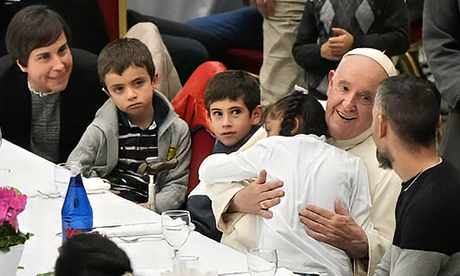Catholic theology needs to undergo a “paradigm shift” says Pope Francis.
Citing the need to deal with “profound cultural transformations,” Francis’s vision for Catholic theology’s future is encapsulated in a new motu proprio (apostolic letter) issued on Saturday.
Called “Ad theologiam promovendam” (To Promote Theology), the letter revises the Pontifical Academy of Theology (PATH) statutes.
Francis says his aim in doing so is “to make them more suitable for the mission that our time imposes on theology.”
Theology can develop only in a culture of dialogue and encounter between different traditions and different knowledge, he says.
It needs to consider “different Christian confessions and different religions, openly engaging with everyone, believers and nonbelievers.”
Fundamentally contextual
Catholic theology must experience a “courageous cultural revolution” to become a “fundamentally contextual theology” Francis wrote.
Guided by Christ’s incarnation in time and space, this theological approach must be able to read and interpret the Gospel as and where people are.
Francis contrasted this approach with theology limited to “abstractly re-proposing formulas and schemes from the past.”
Theological studies must be open to the world as a profound “turning point” in their method, which must be “inductive” Francis wrote.
He stressed that this bottom-up re-envisioning of theology is necessary to better aid the Church’s evangelising mission.
“A synodal, missionary and outgoing Church can correspond only to an outgoing’ theology” he wrote.
This dialogical approach can allow theology to “broaden the boundaries” of scientific reasoning, by allowing it to overcome dehumanising tendencies, he says.
‘Transdisciplinary’ and pastoral
Theology must become a “transdisciplinary” part of a “web of relationships” to achieve change, Pope Francis explained.
Priority must be given to “the knowledge of people’s common sense” he says.
This is a “theological source in which many images of God live, often not corresponding to the Christian face of God, only and always love.”
This “pastoral stamp” must be placed upon all of Catholic theology, he insists.
Described as “popular theology,” theological reflection can help with discerning the “signs of the times” he wrote. Theology serves with evangelisation and in transmitting faith, so that faith becomes culture.
Next steps
PATH’s president, Bishop Antonio Staglianò, welcomes the fresh outlook.
“Pope Francis entrusts our Pontifical Academy with a new mission: that of promoting, in every area of knowledge, discussion and dialogue … to reach and involve all of the people of God in theological research so … [their life] becomes theological life.”
PATH will now “network with universities and centres of production of culture and thought,” he says.
It will also explore “culturally qualified” ways to propose the Gospel as a life guide, even to atheists.
In addition, PATH will exercise a commitment to “intellectual charity” by focusing on the questions and needs of those “on the existential peripheries.”
Source
